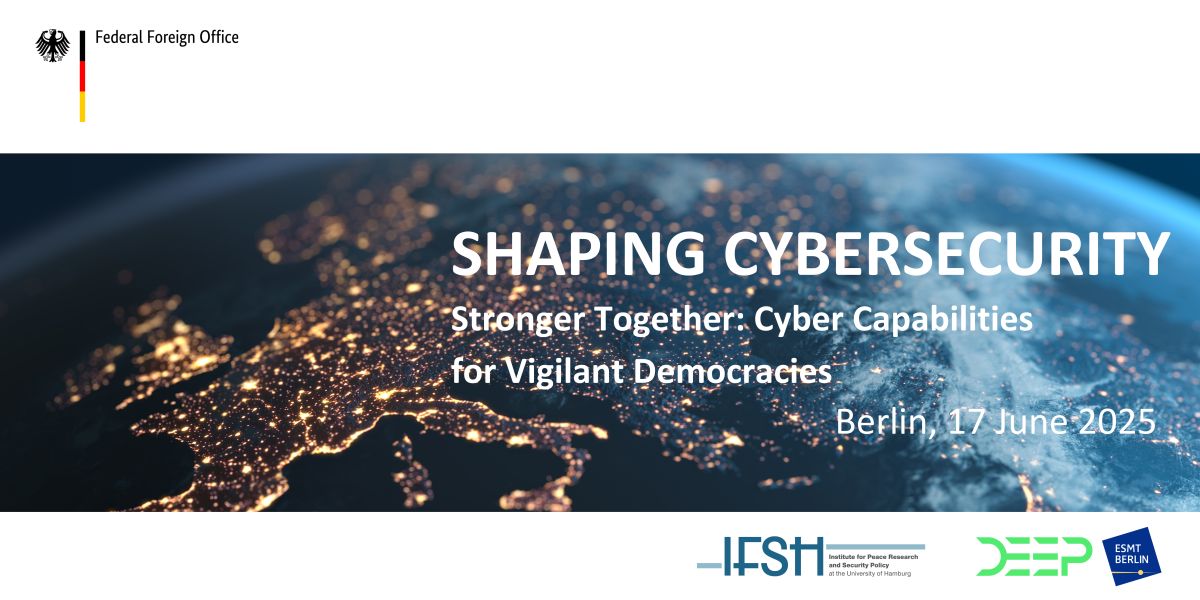The Shaping Cybersecurity Conference 2025, co-hosted by the German Federal Foreign Office (AA), the Institute for Peace Research and Security Policy (IFSH) and the DEEP – Institute for Deep Tech Innovation at ESMT Berlin are bringing in experts to discuss the topic “Stronger Together: Cyber Capabilities for Vigilant Democracies”.
Geopolitical tensions increasingly affect the cyber and digital space. In conflicts, such as the Russian aggression against Ukraine, cyberspace is part of the battlefield. Digital societies like Germany are increasingly being targeted by state-sponsored malicious cyber activities and cyber crime. Democratic systems are under pressure through foreign influence operations and rising techno-authoritarianism. At the same time, technological innovations such as Artificial Intelligence (AI) are fundamentally reshaping cybersecurity.
Addressing these challenges requires unified action and strategic responses. Thus, the conference will explore how democracies can strengthen their cyber security and resilience at the national, European and international level to safeguard our democratic systems and help shape norms and standards, including through the lens of a growing AI-Cyber nexus.
Conference Format
The event will be held in English under the Chatham House Rule with the participation of stakeholders from government, academia, industry, civil society, and the media. After a morning session with high-profile keynote speakers and panel discussions, the afternoon will also foresee break-out formats to ensure a comprehensive and lively discussion.
The first session will provide a situational overview to set the state for subsequent discussions by clarifying the status quo and highlighting the urgency for action. It will discuss existing and emerging challenges and threats in cyberspace. This includes topics such as changes in the cybersecurity threat landscape, the impact of AI on cybersecurity, the rise of techno-authoritarianism and the impact of geopolitical shifts on the cyberspace.
Building on the threat analysis, the second session will explore potential political (and technical) responses both on the national and international level. Panelists will address, among others, the need for a narrative shift and for renewed multilateral cooperation, also at EU level, as well as ways to strengthen existing norms and rules on how to behave in cyberspace and reduce dependencies.
Following the plenary discussions, three simultaneous workshops will enable an even more practical and thematic dialogue.
Each workshop will discuss potential diplomatic, political, or technological responses, drawing from expert and audience input. The final wrap-up session will consolidate key insights from the three workshops in order to provide a perspective on the underlying question of this conference: What are the necessary steps that democratic governments and societies need to take today and tomorrow?
In parallel, a gallery walk will showcase European tech start-ups that develop technologies that support democratic resilience.
Moderating this event will be Katie Gallus.
The in-person event takes place on June 17, 2025 from 9:15 to 16:45 followed by a reception at ESMT Berlin, Schloßplatz 1, 10178 Berlin, Germany. Registrations begin at 8:30.
Below you can find the detailed agenda for the event.
Agenda | Shaping Cybersecurity Conference 2025
An opening-reception will be hosted on the eve of the conference on Monday, June 16, 2025 at Internationaler Club im Auswärtigen Amt, Kurstr. 36, 10117 Berlin from 18:00 to 20:00.
June 17, 2025 – 09:15 – 18:00 ESMT Berlin, Schlossplatz 1, 10178 Berlin
08:30 – 09:15 Registration and Welcome Coffee
09:15 – 09:30 Welcome address
Opening by Dr. Katharina Stasch, Director-General for International Order, the United Nations and Arms Control, Federal Foreign Office, Germany
09:30 – 10:00 Keynote Perspective and Lightning Panel
- “Cyber, Hybrid, Disinformation: Challenge for the global order?” by Dr. Stormy-Annika Mildner, Executive Director, Aspen Institute Germany
10:00 – 10:25 Coffee break
10:25 – 11:40 Panel I
“Emerging Cyber Challenges for Resilience and Democratic Integrity“
- Friederike Dahns, Director General for Cyber- and Information Security, Federal Ministry of the Interior, Germany
- Susanne Dehmel, Member of the Board, Bitkom
- Floreta Faber, Deputy Director General / Envoy for Cyber Diplomacy, National Cyber Security Authority, Albania
- Andrew Whittaker, Cyber Director, Foreign, Commonwealth & Development Office, United Kingdom
11:40-12:00 Keynote
- Florian Hahn, Minister of State at the Federal Foreign Office, Germany
12:00 – 13:00 Lunch & Gallery Walk
Start-Ups present
- Philipp Dewald, Co-Founder & CEO, Detesia
- Raafat Hantoush, Founder & CEO, CyberTide
- Tobias Heldt, Co-Founder & CEO, XOR
- Max Losch, Senior Machine Learning Engineer, QuantPi
- Julius Muth, Co-Founder & CEO, CompanyShield
- Johannes Noll, Co-Founder & CEO, CodeShield
- Tobias Scharnowski, Co-Founder & CEO, Fuzzware
- Stefan Steinberg, COO, RedMimicry
- Maximilian von Lonski, Founder & CEO, VISS
13:15 – 14:30 Panel II
“Shaping Narratives and cyber Capabilities for vigilant Democracies“
- Emmanuella Darkwah, Senior Manager International Cooperation, Cyber Security Authority, Ghana
- Sasha Havlicek, CEO and Founder, Institute for Strategic Dialogue
- Manon LeBlanc, Deputy Head Hybrid Threats and Cyber Division, European External Action Service
- Ernst Noorman, Ambassador at Large for Cyber Affairs, Netherlands
- Major General Jürgen Setzer, Vice Chief Cyber and Information Domain Service and Chief Security Officer (CSO) Bundeswehr, Germany
14:30 – 14:50 Coffee break & Gallery Walk
14:50 – 16:15 Thematic Workshops running in parallel
Track A
Scenario-Based Discussion
- Dr. Joyce Hakmeh, Director International Security, Chatham House
- Kimberley Raleigh, Senior Policy Advisor, U.S. Department of State
- Clare T., Deputy Director Legal, National Cyber Security Centre, United Kingdom
Workshop “Track A” is by invitation-only.
Moderator: Sebastian B., Federal Office for Information Security (BSI) Germany
Track B
AI as a defender – Leveraging AI for cyber-resilient societies
- Max Losch, Senior Machine Learning Engineer, QuantPi
- Peter Stolz, Co-Founder, Detesia
Moderator: Meri Roboçi, AVP, Information Security & AI Governance, DWS
The workshop will be independently organized by ESMT and does not necessarily reflect the views of the Federal Government of Germany.
Track C
Cyber capabilities across domains: Lessons from the global stage
- Konstantin Bellini, Director of Community of Interest on Strategy and Defence at the European Centre for Excellence for Countering Hybrid Threats (CoE), Helsinki, Finland
- Dr. Tine Munk, Senior Lecturer at the Nottingham Trent University, Nottingham, United Kingdom
- Hans Horan, Strategic Analyst, Hague Centre for Strategic Studies, Netherlands
- Sophia Armanski, Head of Division for Strategic Communication, Federal Foreign Office, Germany
Moderator: Dr. Matthias Schulze, Institute for Peace Research and Security Policy at the University of Hamburg (IFSH)
The workshop will be independently organized by IFSH and does not necessarily reflect the views of the Federal Government of Germany.
16:15 – 16:45 Sharing and Reflections – Workshop Take-Aways and closing of conference
- Maria Adebahr, Cyber Ambassador of the Federal Foreign Office, Germany
16:45 – 18:00 Farewell Reception

